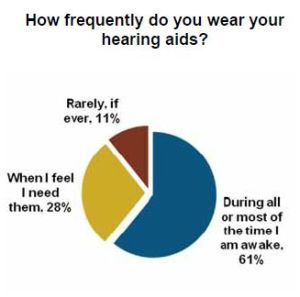I don’t need hearing aids
March 4, 2012 Leave a comment
Last year, AARP (formerly the American Association for Retired Persons) and ASHA (American Speech-Language-Hearing Association) administered an online/telephone based survey to 2,232 Americans who were older than 50 years of age. The survey had to do with key issues regarding their hearing health: attitudes, needs, knowledge regarding hearing help, and barriers to hearing health-care. It came up with some findings that affirmed what most audiologists already know:
 Many older adults may suspect that they have a hearing problem and acknowledge that it is an important health concern, but do not seek help. Only 43% of the respondents had their hearing checked in the year preceding the survey. Where I am not aware of any specific guidelines for frequency of hearing testing in this age group, it is a good idea to get hearing tested annually, especially if there is a concern hearing is at risk. Free hearing screenings are periodically available through health networks and/or local universities with speech and hearing programs.
Many older adults may suspect that they have a hearing problem and acknowledge that it is an important health concern, but do not seek help. Only 43% of the respondents had their hearing checked in the year preceding the survey. Where I am not aware of any specific guidelines for frequency of hearing testing in this age group, it is a good idea to get hearing tested annually, especially if there is a concern hearing is at risk. Free hearing screenings are periodically available through health networks and/or local universities with speech and hearing programs.
Among older adults who own hearing aids, many do not use them consistently (39%), even though they might feel that it improves their quality of life. One of the problems associated with inconsistent use of hearing aids is that it makes it difficult to get used to them. There is a period of adjustment associated with the use of hearing devices, just like with any other equipment. Inconsistent use is an issue because it eventually results in dissatisfaction with performance.
Hearing loss affects social relationships (44%). Maintaining conversations with family and friends becomes effortful and leads to a tendency for the person with hearing loss to: a) pretend that he/she has heard and understood what was said, b) change the topic of conversation or dominate conversation, and c) withdraw from such social interactions, or a combination of these reactions. Something the survey did not touch on is the effect of hearing loss on communication partners. Unless both parties understand the challenges they face and make an effort to increase the effectiveness of communication, hearing loss is stressful both to the person with hearing loss and their communication partner.
The most common issue with regards to hearing is being able to hear in background noise. 57% of the respondents identified this as a major issue with their hearing. Where the performance of current hearing aids in this environment needs improvement, there are a few simple things that the person with hearing loss can do to make their lives easier. Avoiding noise altogether is impossible, but when trying to have a conversation, you can control your immediate environment to a certain extent. For instance, turning down background noise such as the television or the radio may help. When in the car, rolling up the windows could cut down significantly on wind noise. Moving to a room that is quieter, choosing a seat in the restaurant that is away from potential sources of noise (kitchen, bar), and most importantly, facing the communication partner should help, although I realize that these tips may not help all the time.
The most important reason cited for not seeking help was that the perceived hearing loss was minor and ‘easy to live with’(58%). In the US, many older adults live by themselves or with their spouse and do not feel the need for a hearing aid since they ‘get by’ at home. However, the perceived severity of hearing loss may not necessarily be reflective of objective measures of hearing ability. Even when at home, people with hearing loss may miss out on sounds, which may affect safety. Regarding the occasions when one is not at home, the ability to communicate successfully perhaps becomes even more important and challenging, since these are conversations in unfamiliar surroundings and often with less familiar people. Other reasons for not seeking help includes cost, perceived benefit of hearing aids (family member/friend had poor experience) and other heath issues taking precedence.
This survey brings to light some pressing issues that affect hearing health-care in this age group. Clearly, hearing health-care needs to be more accessible to older adults, and this survey is a step in the right direction. If you are someone interested in learning more about hearing health in older adults, I would encourage you to read the summary of results from the survey here.